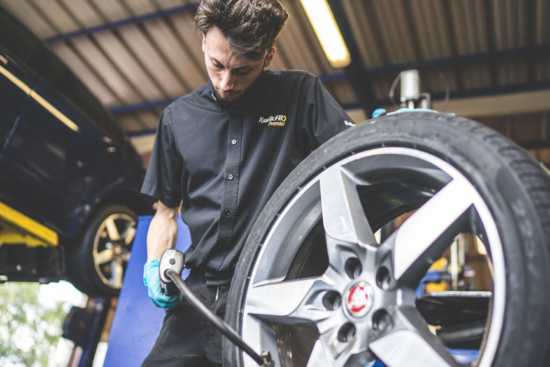Kwik Fit: Cost of living crisis affecting most drivers
 Rising motoring costs have prompted some drivers to regularly check tyre pressures (Photo: Kwik Fit)
Rising motoring costs have prompted some drivers to regularly check tyre pressures (Photo: Kwik Fit)
Results of a survey conducted on behalf of Kwik Fit suggest 69 per cent of motorists have changed their driving behaviour since the beginning of the year. Altered habits include cutting down on ‘non-essential’ car journeys, something 35 per cent of the 2,000 respondents admitted to doing. Drivers of petrol or diesel cars are almost twice as likely to cut down on such trips, with 40 per cent doing so as opposed to 22 per cent of electric vehicle (EV) drivers.
The cost of living crisis has also prompted many drivers to reappraise their driving styles, and 21 per cent of drivers say they have consciously tried to drive more smoothly or less aggressively. 14 per cent claim they have driven more slowly on all their journeys and 17 per cent that they’ve cut speeds on some journeys. Despite the average low emission car (EV or hybrid) being less costly to run, drivers of these vehicles are more likely to have decreased their speed than drivers of petrol or diesel engine cars.
Rising costs affect young drivers more
The information obtained by market research firm Opinium between 26 and 29 April indicates that 17 per cent of drivers of EVs or hybrids have swapped from a diesel or petrol car this year as a direct result of the cost of living crisis. Some car owners have made an even more dramatic switch – four per cent of drivers say they have sold their car this year and not replaced it. The research findings highlight that the impact of rising costs is not uniform across different groups – drivers under 35 are a staggering eight times more likely to have sold their car and not replaced it than drivers over 55.
One in ten London drivers say they have sold their car and not replaced it. This may be due to the availability of public transport options as an alternative to private car journeys, as 14 per cent of drivers in the capital say they have made more of their essential journeys by public transport or have car shared. This is the highest figure of all UK regions and compares to only four per cent in the more rural areas of the South West and East of England, the regions with the lowest number of drivers switching to public transport.
Although the government may be keen to reverse the home working revolution that was driven by the pandemic and get people back to the office, Kwik Fit’s research shows that the cost of living crisis may not help in their aim. 11 per cent of drivers say that since January they have been working from home even more often in order to save money on driving costs.
The increasing cost of motoring has prompted some drivers to take up good motoring maintenance habits. Ten per cent of drivers say they have started regularly checking their tyre pressures, while 11 per cent have emptied their car boot of any heavy items. Three per cent of drivers say they have removed roof racks, bars or bike racks which they normally keep permanently on their car; eight per cent of drivers under 35 say they have done this.
Traffic below pre-pandemic volume
These research findings for Kwik Fit tie in with official government data on car use. DfT data on transport use during the pandemic published last month shows that in 2021 car traffic returned towards the same levels as the equivalent days before the pandemic and by June 2021 was regularly exceeding those figures. However, since January 2022, daily car usage has exceeded the equivalent pre-pandemic volume on only five occasions.
“The cost of living crisis is impacting many areas of our lives and motoring is no exception,” says Roger Griggs, communications director at Kwik Fit. “While some drivers are able to cut down on their journeys, many of the journeys motorists make are essential and cannot be made by other means.
“We would encourage all motorists to make sure their car is running as efficiently as possible and to especially take the measures that cost nothing – ensure that their tyres are at the correct pressure and that the car is not suffering from unnecessary weight in the boot or drag on the roof,” Griggs continues. “Seemingly small measures can have a big impact on fuel consumption and of course, having the correct tyre pressure will also help prolong the life of a tyre by reducing premature wear.”
Kwik Fit says drivers can check the correct pressure for their tyres on its website, and can book in for a free tyre inspection if they so wish.





Comments